(1424 products available)
































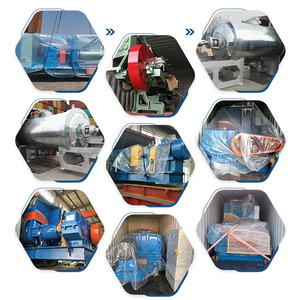






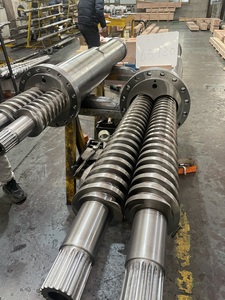

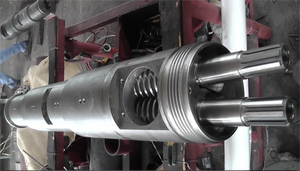




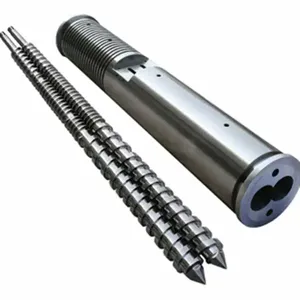





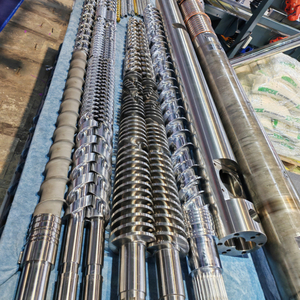
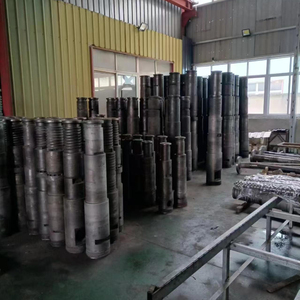



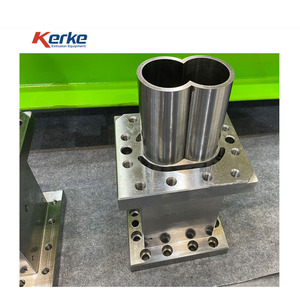

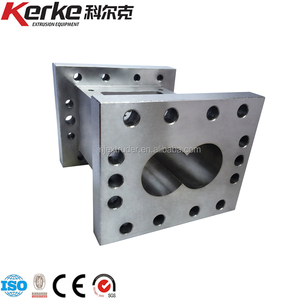

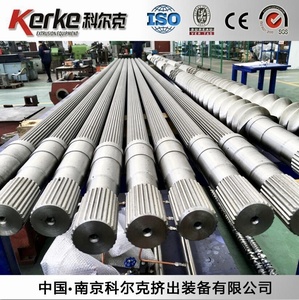


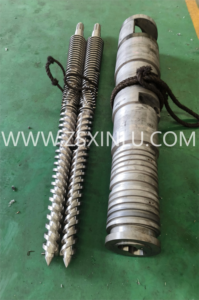




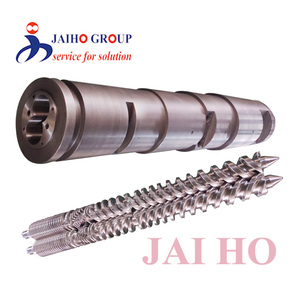
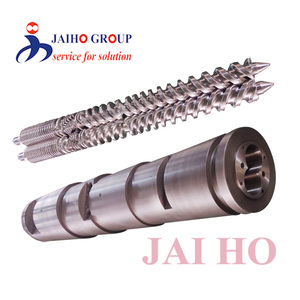


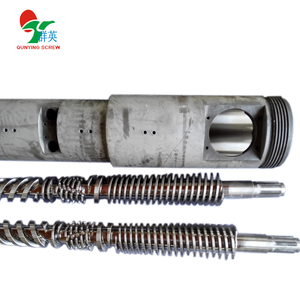
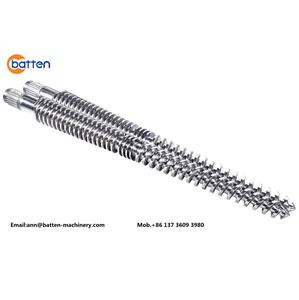




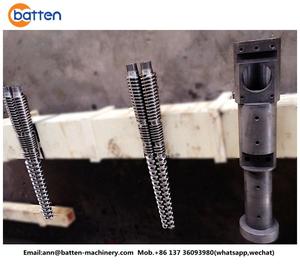

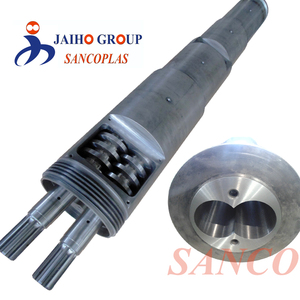
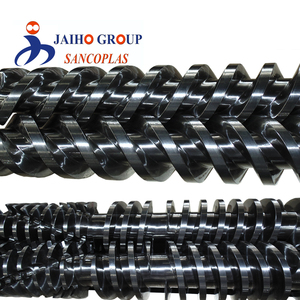
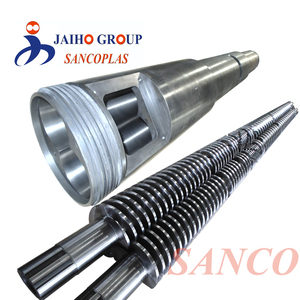


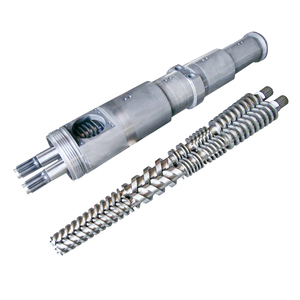

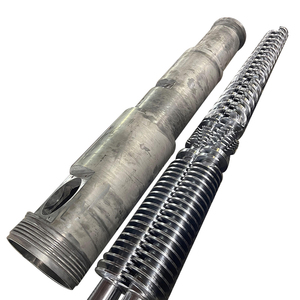


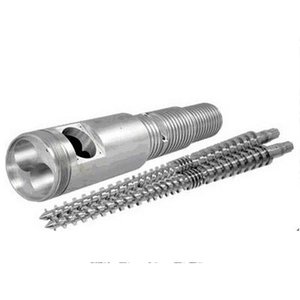

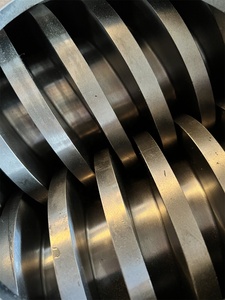
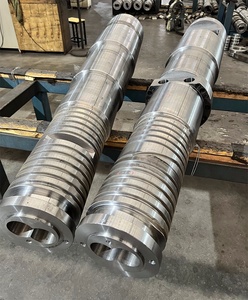




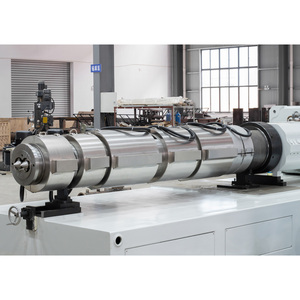
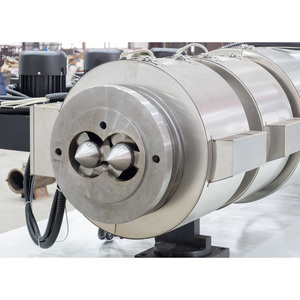


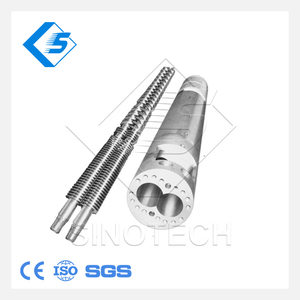




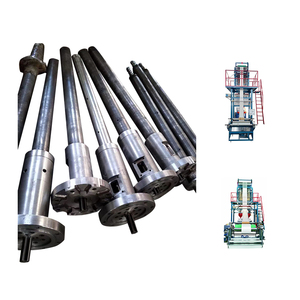


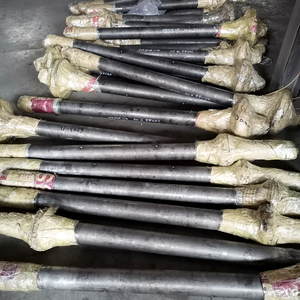

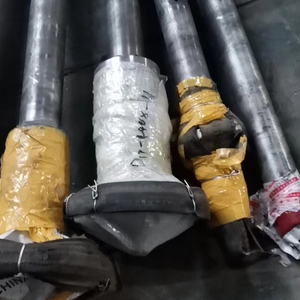



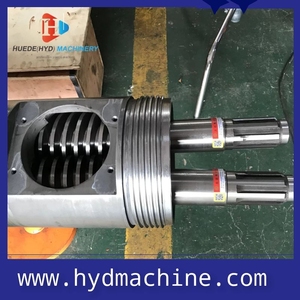

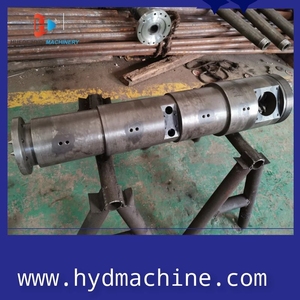








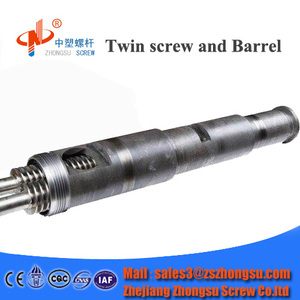
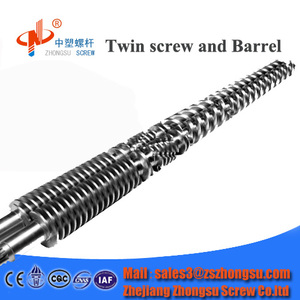

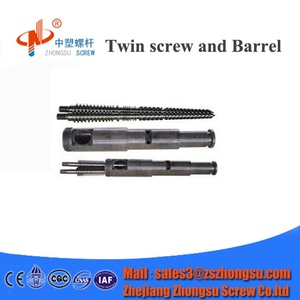




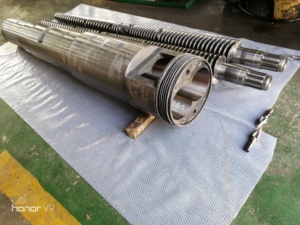
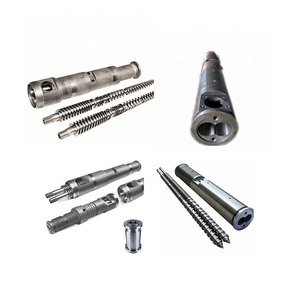






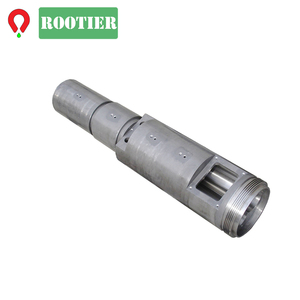





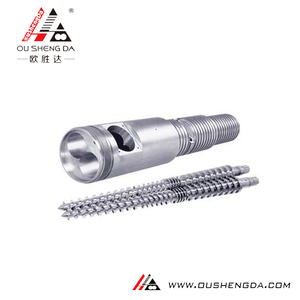
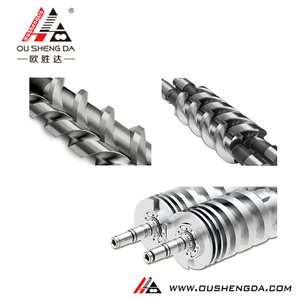
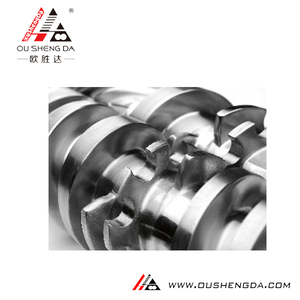

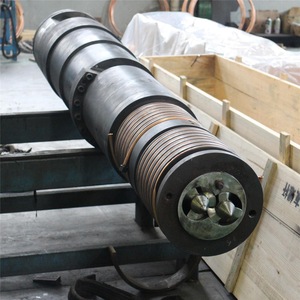




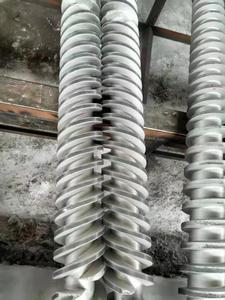


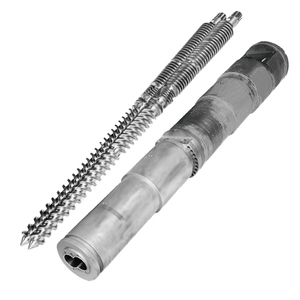
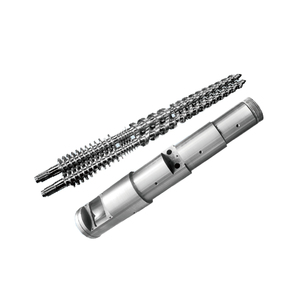
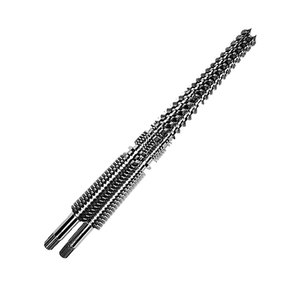



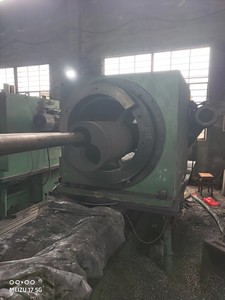


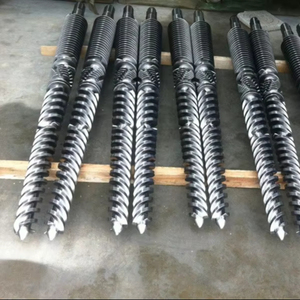
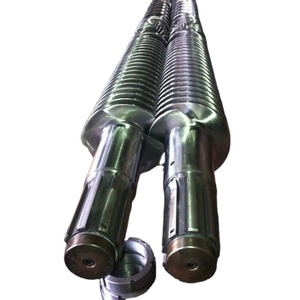
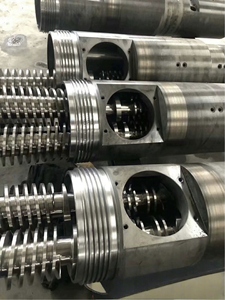

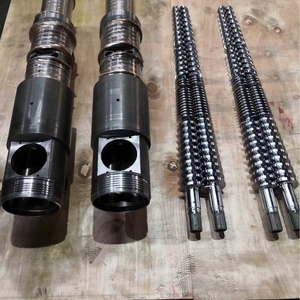


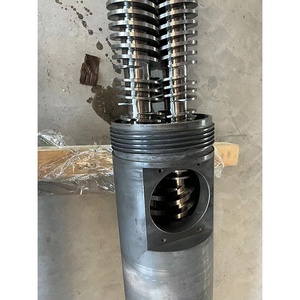
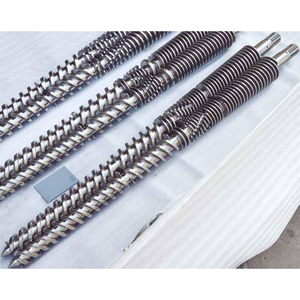

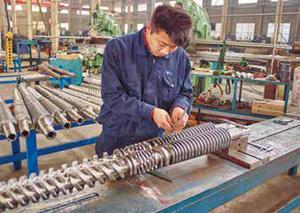



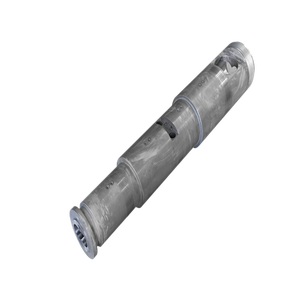



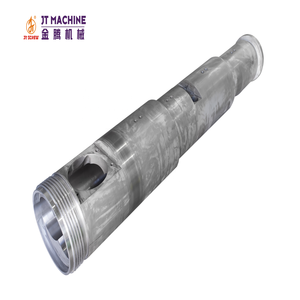




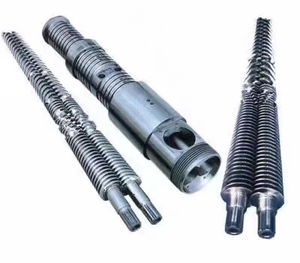
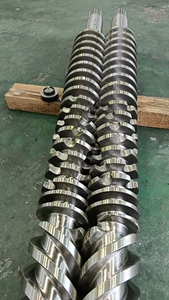


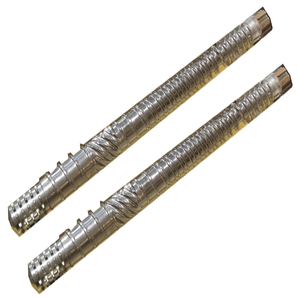



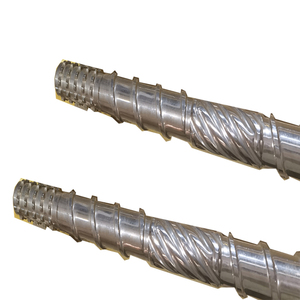
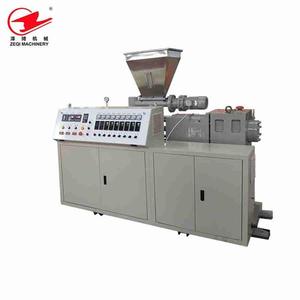
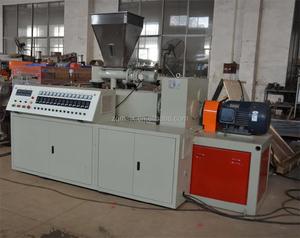
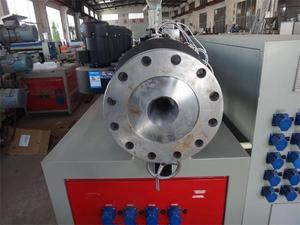



The conical twin screw barrel extruder comes in varying designs and models to suit different applications. The following table summarizes some of them:
Industrial Conical Twin Screw Barrel Extruder
The industrial conical twin screw extruder features large-scale production capacity. Manufacturers use it to produce and process dense materials like PVC. The extruder is attached to a feeder that pushes the raw materials to the barrel's interior. The screws then rotate and mix the materials and air bubbles in the cylinder. Finally, the product is released through the nozzle or die.
Small Conical Twin Screw Barrel Extruder
Unlike the industrial conical extruder, the small conical twin screw barrel extruder is suited for smaller-scale production. It comes with a bench or tabletop design so users can easily integrate it into their workflow.
Food Conical Twin Screw Barrel Extruder
Food conical twin screw barrel extruders are designed explicitly for food processing. They comply with food safety standards and regulations. The extruder also comes with a homogenization feature that ensures ample mixing and limb removal.
Medical Conical Twin Screw Barrel Extruder
The medical conical twin screw extruder is manufactured for various medical applications. It can produce medical-grade polymer, catheters, stents, and e-health devices, to mention but a few. Conical twin screw barrel extruders for medical use are manufactured with precision and according to GMP standards.
Plastic Conical Twin Screw Barrel Extruder
The conical twin screw extruder for plastic comes in different models to process various types of plastic, such as thermoplastics, elastomers, and thermosetting plastics. It also incorporates special features for plastic products, such as a vacuum vent for degassing and specific die designs for molding different shapes.
Co-Rotating Conical Twin Screw Barrel Extruder
Both screws rotate in the same direction in a co-rotating conical twin screw extruder. This design improves mixing, material conveying efficiency, and shear force. The Co-rotating conical twin screw extruder is suitable for applications that demand high-density material and custom compound.
Counter-Rotating Conical Twin Screw Barrel Extruder
In a counter-rotating conical twin screw extruder, the upper screw rotates in the opposite direction to the lower one. The design promotes efficient material transfer and is well-suited for processing high-viscosity materials.
Screw diameter and length
The diameter of the screw can vary, usually between 60 mm and 150 mm. The length-to-diameter ratio (L/D) of the screw can also vary depending on the type of material to be processed, usually between 24:1 and 36:1.
Temperature control
Conical twin screw extruders are usually equipped with several temperature control zones along the barrel. Each zone can have temperature control with an accuracy of +/- 2 degrees Celsius. The temperature control range is typically from 0 to 350 degrees Celsius.
Motor power
The power of the motor driving the screw can vary depending on the model of the extruder, typically between 30 kW and 200 kW.
Regular cleaning
It is necessary to clean the conical twin-screw extruder barrel and screw regularly to remove the residual material and dirt from the processing to prevent material contamination and degradation.
Check the wear of barrels and screws
Over time, the barrel and screw may wear and need to be replaced or repaired to ensure consistent processing quality and performance.
Check the temperature control system
It is necessary to check periodically whether the temperature controllers and heating/cooling devices of each section are working properly to ensure that the extruder can operate at the appropriate temperature.
Lubrication
The moving parts of the twin-screw extruder, such as bearings, etc., need to be lubricated regularly to ensure smooth operation and to avoid wear.
Check the sealing components
Checking and replacing the sealing elements, such as seals and gaskets, to prevent material leakage and ensure consistent processing.
Conical twin screw extrusion machines are useful for the construction, automotive, medical, and food industries.
Construction
In the construction industry, a conical twin screw barrel extruder makes CPVC, PVC, and other pipes and profiles. The CPVC and PVC profiles are used to manufacture windows, doors, and different piping systems. Other PVC components that the extruder produces include flooring, wall cladding, and plumbing fittings.
Automotive
The conical twin screw barrel extruder produces a wide range of automotive parts. It can process various nylon materials to make complex and lightweight automotive components, such as bumpers, interior trims, instrument panels, and gears. These include door trims, seat components, headlamps, grilles, bumpers, air intake manifolds, timing belt covers, and other lightweight structural parts.
Additionally, the machine can make multilayer car battery cases with flame-retardant properties. The case efficiently stores energy and meets diverse automotive requirements, including electric vehicles (EVs).
Medical
In the medical industry, the extruder fabricates medical tubes and catheters used in healthcare devices. It can also produce high-performance medical equipment components. Some of these are made from bio-resilient, bio-degradable, and antibacterial materials.
Food
The conical twin screw barrel extruder is widely used in food processing. It is an essential piece of machinery for making snacks, pasta, breakfast cereals, and pet food. The extruder can blend, cook, and shape various food products, such as textured vegetable protein (TVP), cereals, grains, and aquatic feed.
When purchasing a conical twin screw extruder, certain factors must be taken into consideration to match specific processing needs.
Materials:
The design and arrangement of the screws can be varied based on the material to be processed, e.g., the flow properties of the material, the melting and mixing needs, and other specific requirements. As a result, some materials may need surface treatments, such as nitrogen spraying or bimetallic coatings, to last longer.
Production Scale:
For small-scale production, efficiency might be more significant than energy consumption. However, for large-scale production, the extruder's energy efficiency and capacity are vital.
The Process:
Whether one's processing entails melting, reaction, and degradation or mixing, filling and pelletizing, a specific kind of extruder will be more suited.
Budget:
Mass production models are more efficient but also pricier. In contrast, models suitable for small batches are more affordable.
Screw Design:
Various screws have distinctive features and adaptability, such as their lengths versus diameters, conveying elements, mixing elements, and distributive or dissipative features. Choosing the proper screw design is crucial to achieving the desired processing results.
Heating/Cooling:
Extruders can be heated through oil, water, electric bands, or induction. Cooling methods include water jackets, heat exchangers, and mist cooling. The recommended practice is to select the suitable method based on the required melt temperature and other specific conditions.
Automatic Control:
Modern extruders often have automatic control features, such as temperature, current, speed, pressure, and other elements. The machine can be monitored and controlled via a computer, which makes production more convenient and efficient. Depending on one’s needs and budget, one can consider choosing an extruder with different levels of automatic control.
Extruder Supplier:
It is essential to research the provider before buying the desired extruder. The supplier's reputation, the models and services offered, and other critical aspects should all be considered crucial parameters in choosing the right equipment.
Q1: Why is the conical twin screw extruder preferred over other types of extruders?
A1: The conical twin screw extruder is favorable due to its fantastic feeding capacity and versatility. It can process various materials with different viscosities and can adapt to multiple applications. Additionally, the conical twin screw extruder is well-suited for producing high-quality end products.
Q2: What are the current trends in conical twin screw extruder technology?
A2: Recent advancements in conical twin screw extruders include energy-efficient models, improved feed systems for diverse materials, enhanced control technology for precise parameters, and developments in screw design for better processing and product quality.
Q3: How long does a conical twin screw extruder typically last?
A3: If appropriately maintained, the conical twin screws can last for 10 to 20 years or even longer. Their longevity depends on factors like material compatibility, maintenance routine, extruder design quality, and operating conditions.